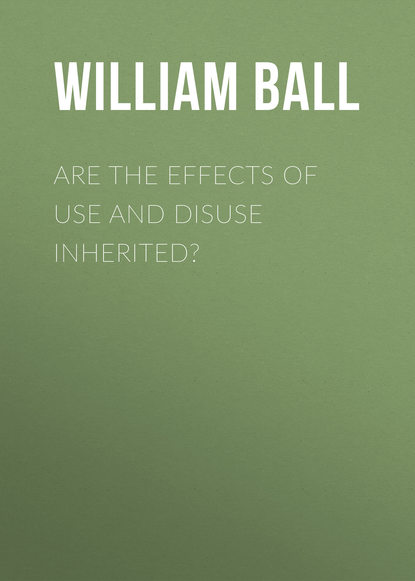По всем вопросам обращайтесь на: info@litportal.ru
(©) 2003-2024.
✖
Are the Effects of Use and Disuse Inherited?
Настройки чтения
Размер шрифта
Высота строк
Поля
10
I venture to coin this concise term to signify the direct inheritance of the effects of use and disuse in kind. Having a name for a thing is highly convenient; it facilitates clearness and accuracy in reasoning, and in this particular inquiry it may save some confusion of thought from double or incomplete meanings in the shortened phrases which would otherwise have to be employed to indicate this great but nameless factor of evolution.
11
Origin of Species, pp. 230-232; Bates's Naturalist on the Amazons. Darwin is "surprised that no one has hitherto advanced the demonstrative case of neuter insects, against the well-known doctrine of inherited habit, as advanced by Lamarck." As he justly observes, "it proves that with animals, as with plants, any amount of modification may be effected by the accumulation of numerous, slight, spontaneous variations, which are in any way profitable, without exercise or habit having been brought into play. For peculiar habits confined to the workers or sterile females, however long they might be followed, could not possibly affect the males and fertile females, which alone leave any descendants." Some slight modification of these remarks, however, may possibly be needed to meet the case of "factitious queens," who (probably through eating particles of the royal food) become capable of producing a few male eggs.
12
Descent of Man, pp. 573, 572, and footnote.
13
Contemporary Review, December, 1875, p. 92.
14
See Origin of Species, pp. 5-8. "Changed conditions induce an almost indefinite amount of fluctuating variability, by which the whole organization is rendered in some degree plastic" (Descent of Man, p. 30). It also appears that "the nature of the conditions is of subordinate importance in comparison with the nature of the organism in determining each particular form of variation; – perhaps of not more importance than the nature of the spark, by which a mass of combustible matter is ignited, has in determining the nature of the flames" (Origin of Species, p. 8).
15
Weismann's Essays on Heredity, &c. Clarendon Press, 1889.
16
Life and Letters, i. p. 16. Darwin's reverence for his father "was boundless and most touching. He would have wished to judge everything else in the world dispassionately, but anything his father had said was received with almost implicit faith; … he hoped none of his sons would ever believe anything because he said it, unless they were themselves convinced of its truth – a feeling in striking contrast with his own manner of faith" (Life and Letters, i. pp. 10, 11).
17
Ibid., i. p. 38.
18
Life and Letters, ii. p. 14.
19
Origin of Species, pp. 117, 118.
20
Ibid., p. 180.
21
Contemporary Review, December, 1875, pp. 89, 93.
22
Variation of Animals and Plants under Domestication, i. 292.
23
Variation of Animals and Plants under Domestication, i. 299-301.
24
To keep pace with this lateral increase in weight, the leg-bones should have lengthened considerably so that their total deficiency in proportional length is 17 per cent., – a changed proportion which being linear is more excessive than the increase of weight by 28 per cent. So marked is the effect of the combined thickening and shortening that in the Aylesbury breed – which is the most typically representative one – the leg-bones have become 70 per cent. heavier than they should be if their thickness had continued to be proportional to their length.
25
This excessive thickening under disuse appears to be due partly to a positive lateral enlargement or increase of proportional weight of about 7½ per cent., and partly to a shortening of about 15 per cent. Carefully calculated, the reduction of the weight of the wing-bones in this breed is only 8·3 per cent. relatively to the whole skeleton, or only 5 per cent. relatively to the skeleton minus legs and wings. The latter method is the more correct, since the excessive weight of the leg-bones increases the weight of the skeleton more than the diminished weight of the wing-bones reduces it.
26
Variation of Animals and Plants under Domestication, i. 284.
27
Variation of Animals and Plants under Domestication, i. 184, 185.
28
Ibid., i. 144, 145.
29
Ibid., i. 185.
30
Variation of Animals and Plants under Domestication, i. 175.
31
Variation of Animals and Plants under Domestication, i. 184. I suspect that Darwin was in poor health when he wrote this page. He nods at least four times in it. Twice he speaks of "twelve" breeds where he obviously should have said eleven.
32
If a prominent breast is admired and selected by fanciers, the sternum might shorten in assuming a more forward and vertical position. If the shortening of the sternum is entirely due to disuse, it seems strange that Darwin has not noticed any similar shortening in the sternum of the duck. But selection has not tended to make the duck elegant, or "pigeon-breasted"; it has enlarged the abdominal sack instead, besides allowing the addition of an extra rib in various cases.
33
Variation of Animals and Plants under Domestication, 144, 175.
34
Variation of Animals and Plants under Domestication, i. 179.





